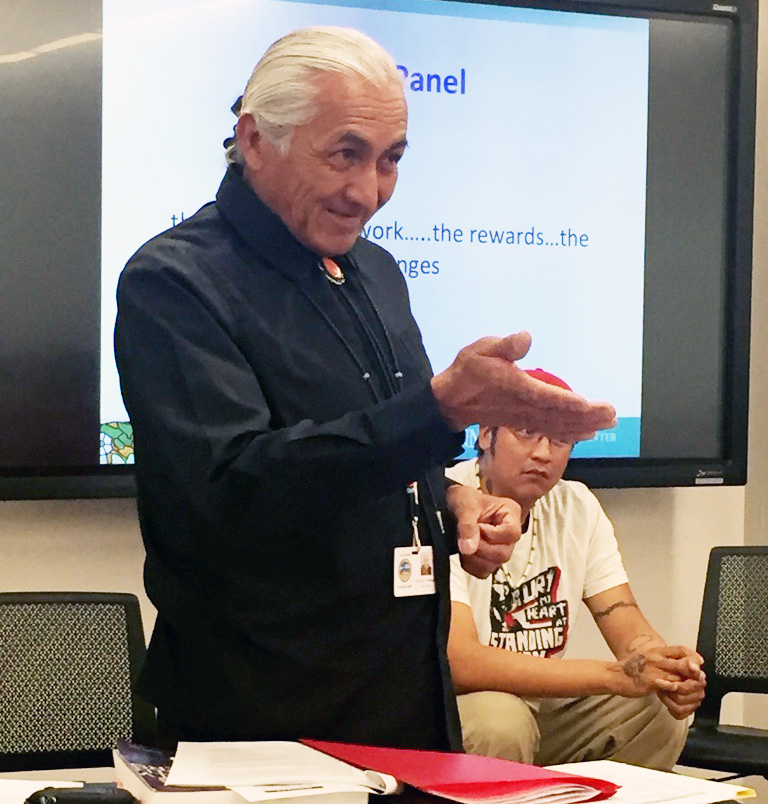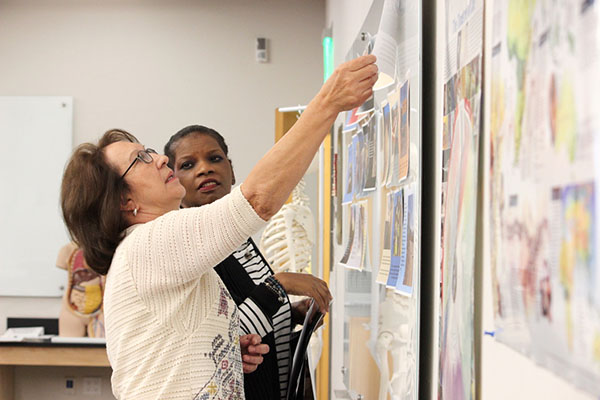Certificate Program in Community Health
The Community & Public Health Program at UNM-Taos provides trainees with a foundational set of knowledge and skills aligned with national workforce studies and industry-recognized standards. It is fully-endorsed by the New Mexico Department of Health (NMDOH), and completion of the program confers graduates with eligibility to apply for NM state certification as a Community Health Worker (CCHW). Financial aid is available for students who qualify, and the program is open to dual enrollment students.

Who are Community Health Workers & What Do They Do?
 Known by many names - including Community Health Representatives (CHRs), Outreach Workers, Health Navigators, Home Visitors, Health Advisors, Family/Peer Advocates, and promotoras de salud – these and over 100 job titles align under the US Department of Labor code for Community Health Workers (CHWs). CHW/Rs are frontline health workers who are trusted members of the communities they serve. They bridge critical access, cultural, linguistic, and other gaps in health and human service systems. They have had great success in increasing access to care, improving chronic disease prevention and control outcomes, delivering educational programming, improving health literacy, advocating for communities, and assisting clients in accessing and navigating complex processes and systems.
Known by many names - including Community Health Representatives (CHRs), Outreach Workers, Health Navigators, Home Visitors, Health Advisors, Family/Peer Advocates, and promotoras de salud – these and over 100 job titles align under the US Department of Labor code for Community Health Workers (CHWs). CHW/Rs are frontline health workers who are trusted members of the communities they serve. They bridge critical access, cultural, linguistic, and other gaps in health and human service systems. They have had great success in increasing access to care, improving chronic disease prevention and control outcomes, delivering educational programming, improving health literacy, advocating for communities, and assisting clients in accessing and navigating complex processes and systems.
CHW/Rs improve the health and well-being of their fellow community members, as well as their community overall. They work and volunteer in community and clinical settings helping people of all ages get the services, knowledge, and tools that they need to be well. At a broader level, CHW/Rs work with community members and leaders to promote a healthy community environment, social justice, and health equity for all. They can be found working in health and human service organizations, schools, non-profit groups, and faith-based organizations, and have deep roots in the communities and cultures of New Mexico.
Program Innovation & Quality
 UNM-Taos was the first college in New Mexico to offer a credit-bearing, standards-based, nationally-aligned training program for CHW/Rs, shaped by decades of on-the-job training of CHW/Rs in healthcare settings. The scope and competencies established by our program demonstration pilot were adopted by the NM-DOH in 2010, following the approval of then Secretary Alfredo Vigil, MD, who also founded the Office of Community Health Workers at the DOH in 2008. Informed by learner and employer feedback, the curriculum has been updated and redesigned into a Certificate in Community Health. The 10 credit-hour degree consists of 6 short courses organized into series of experiential, hands-on workshops that meet 12 Fridays a semester, for two semesters. Two elective courses are available as well. As a certificate it can stand alone, it can be stacked with other frontline health worker credentials (EMT, CNA, LSAA), it can serve as a professional credential added to an existing degree, or can be an educational gateway to an array of health and human service training programs and careers.
UNM-Taos was the first college in New Mexico to offer a credit-bearing, standards-based, nationally-aligned training program for CHW/Rs, shaped by decades of on-the-job training of CHW/Rs in healthcare settings. The scope and competencies established by our program demonstration pilot were adopted by the NM-DOH in 2010, following the approval of then Secretary Alfredo Vigil, MD, who also founded the Office of Community Health Workers at the DOH in 2008. Informed by learner and employer feedback, the curriculum has been updated and redesigned into a Certificate in Community Health. The 10 credit-hour degree consists of 6 short courses organized into series of experiential, hands-on workshops that meet 12 Fridays a semester, for two semesters. Two elective courses are available as well. As a certificate it can stand alone, it can be stacked with other frontline health worker credentials (EMT, CNA, LSAA), it can serve as a professional credential added to an existing degree, or can be an educational gateway to an array of health and human service training programs and careers.
Faculty & Advisory Board
Program instructors are masters-prepared professionals who are seasoned practitioners of the competencies they teach at an advanced-practice level. Their perspectives as trainers are informed by their experiences working as, with, and supervising CHWs on clinical and community health teams. An advisory committee of senior CHWs and CHRs serve as co-trainers, practice mentors, community preceptors, and provide valuable guidance to the program.Is this certificate in Community Health right for me?
- You may currently be working as a CHW/R (under any job title) and want to sharpen your skills and expand your scope
- You may already have a degree and wish to add this to your credentials, as a professional certificate
- You may be interested in becoming a CHW/R, or developing CHW skills that lead to further training in fields such as Health Education, Human Services, Public Health, and Social Work
- You do not need to take other courses to enroll, or to earn this Certificate in Community Health
- CHWs learn how to use their own life experience to help others --- all backgrounds and diverse life experiences are valued and welcomed
How to earn the Certificate in Community Health:
- Complete 10 credit hours, consisting of 6 short courses
- The courses are organized into a series of hands-on workshops that meet 12 Fridays a semester, for 2 semesters
- Program is endorsed by the New Mexico Department of Health. Students who complete the degree requirements are eligible to apply for state certification as a CHW (CCHW)
Consultation and Implementation Support For Employers
This program offers an excellent opportunity for employers to provide low cost, high-quality community health skills training to staff. UNM-Taos provides experienced, pro bono technical assistance to employers seeking to integrate CHW-related roles into their organizations. Please contact the Program Director for more information.FULL COURSE DESCRIPTIONS
The learning objectives and competencies of each course are sequential and build on each other throughout the program. Each credit hour translates into 16 face-to-face hours of training (not including assessment). First semester courses cover knowledge and skills for working with individuals; second semester courses cover knowledge and skills for working with families, groups, and communities.PH 103: Introduction to Community Health Work (1cr).
This course provides an overview of the history and introduction to the CHW profession, including scope of practice, roles, competencies, attributes, and qualities. It provides practice-based guidelines for professional conduct, ethics and boundaries, confidentiality and informed consent. It exposes learners to professional organizations, encourages professional identify and development, and reviews the processes for CHW certification in New Mexico.PH104: Clinical Basics for Frontline Health Workers (1cr).
This elective course prepares students with basic skills for working in clinical and home health settings: vital signs, blood glucose monitoring, foot exams, calculating BMI, OSHA standards, medical terminology, documentation, standing orders, opioid overdose reversal, First Aid, and Basic Life Support (BLS). All learners who successfully complete the program will earn a three-year certification in both CPR and First Aid.PH105: Mental Health First Responder (1cr).
This elective course introduces learners to the risk factors and warning signs of mental health problems, builds an understanding of the importance of early intervention, and reviews common supports. Includes evidence-based strategies for responding to suicide risk and thoughts of self-harm. Students will learn to offer initial help to someone in a mental health or substance use crisis through a 5-step action plan, with the ultimate goal to connect persons to appropriate professional, peer, social, and self-help care. The program also teaches the common risk factors and warning signs of specific types of illnesses like anxiety, depression, substance use, bipolar disorder, and schizophrenia. Participants are introduced to local mental health resources, national organizations, support groups, and online tools for mental health andaddictions treatment and support. Participants will also be trained in identifying, responding to, and administering medication (NARCAN) to reverse opioid overdoses. All learners who successfully complete the program will earn a three-year certification in Mental Health First Aid.
PH 202: Community Health Work: Frameworks, Principles and Practices for Direct Service (1cr).
This course provides a broad introduction to public health as the framework for providing direct services to individuals, with focus on the ecological model, health equity, and healthcare systems. It provides in-depth skills practice forproviding effective service within that framework, including interpersonal and communication skills, cultural humility, and client-centered, strengths-based approaches. It applies those core skills to an array of scenarios including conducting client interviews, managing and resolving conflict, working on a care team, and delivering health literate, trauma-informed care.
PH 203: Health Coaching & Health Promotion (3cr).
This course provides a strong foundation in health coaching and health promotion, with a focus on working with individuals from a broader public health lens. It offers strategies and skills for supporting client-centered behavior change including action planning, motivational interviewing, and communication skills. It identifies barriers to change such as stigma and bias, gaps in health literacy, and offers strategies for addressing those barriers. Lessons learned will be applied to scenarios involving harm reduction, and the self-management of chronic conditions. Using the HEAL model, learners will explore practical frameworks and guidelines for promoting health, delivering health education, and accessing andcommunicating reliable health information.
PH 204: Health Navigation & Service Coordination (1cr).
This course provides an overview of models, skills, tools, resources, and considerations for providing strengths-based health navigation and service coordination with clients. Rooted in the principles of client-centered practice developed in PH202, and motivational approaches to planning change in PH203, this course will explore best practices for planning, conducting, and documenting case-finding and recruitment, establishing and maintaining relationship via client interviewing, developing service plans, making and tracking meaningful referrals, and building client self-efficacy and self-reliance. Addresses the importance of building relationships with referral sources and agencies.PH 205: Health Education & Facilitation (2cr).
This course provides an overview of the major approaches, models, skills, and knowledge needed to plan, facilitate, and evaluate basic health education presentations for groups in clinical and community settings. It provides a similar overview to planning and facilitating groups and group processes for a variety of health-related purposes. The course offers an experiential immersion into principles of adult learning, and explores related media and instructional strategies. It addresses common challenges in group education and facilitation, and promotes best practices for the professional developmentand self-care of educators and facilitators including cultural humility, boundaries, confidentiality, supervision, and managing power dynamics.
PH 206: Health Outreach, Assessment & Advocacy (2cr).
This course provides an overview of various approaches, models, methods, and considerations for doing public health work in community spaces and settings: conducting home visits, health outreach, community organizing, and advocacy for improving community health. Students will learn to utilize a wide range of tools central to this work including environmental scans, community health assessments, surveys, focus groups, canvassing, and PhotoVoice. We will explore the unique the role of the health worker in advocating for communities, surfacing community-identified priorities, and activating and building community-based leadership. Addresses a wide range of considerations related to this aspect of community health work including building relationships and trust, ethics, confidentiality, and safety.

